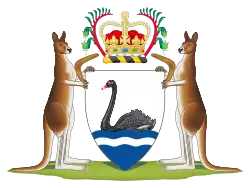
Western Australia was a crown colony from its establishment in 1829 as the Swan River Colony until the advent of representative government in 1870. During this time executive and legislative power was vested in the Governor of Western Australia, but from 1832 he had Executive and Legislative Councils to assist and advise him. The Western Australian Legislative Council met for the first time on 7 February 1832. This is a list of members of the Western Australian Legislative Council between 1832 and 1870.
Official members, 1832–1870
The Western Australian Legislative Council was initially composed of five ex officio members; that is, members by virtue of their official government positions. These official positions were: the Governor, the Commandant, the Colonial Secretary, the Surveyor-General and the Advocate-General. The Collector of Revenue was added in 1847, and the Comptroller-General in June 1852.[1][2]
This is a list of official members of the Western Australian Legislative Council between 1832 and 1870. Due to gaps in official records, some dates are approximate and the list may omit some members who were acting in official positions.
| Period | Official members | ||||||
|---|---|---|---|---|---|---|---|
| Governor | Commandant | Colonial Secretary | Surveyor General | Advocate General | Collector of Revenue | Comptroller General | |
| 7 February 1832 – 1834 | James Stirling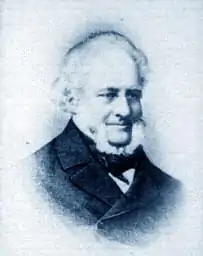 |
Frederick Irwin.jpg.webp) |
Peter Broun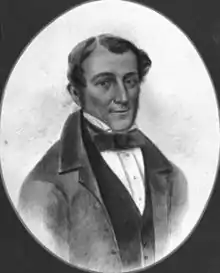 |
John Septimus Roe |
William Mackie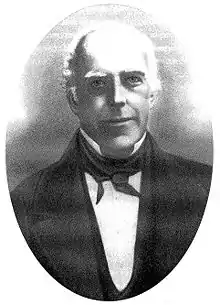 |
Not a member until 1847 | Not a member until 1852 |
| 1834–3 January 1839 | George Fletcher Moore | ||||||
| 3 January 1839 – 27 January 1846 | John Hutt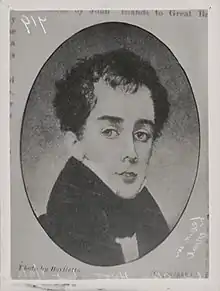 | ||||||
| 27 January 1846–November 1846 | Andrew Clarke | ||||||
| November 1846–May 1847 | George Fletcher Moore (acting) |
Richard West Nash (acting) | |||||
| May–June 1847 | Dr Richard Robert Madden Richard Robert Madden | George Fletcher Moore | |||||
| June 1847–12 August 1848 | Henry Sutherland | ||||||
| 12 August 1848–January 1849 | Charles Fitzgerald | ||||||
| January 1849–March 1850 | Revett Henry Bland (acting) | ||||||
| March–October 1850 | Thomas Yule (acting) | ||||||
| October 1850–March 1851 | Charles Piesse | ||||||
| March 1851 – 1852 | Thomas Yule (acting) | ||||||
| 1852 | Bartholemew Vigors (acting) | Edmund Henderson | |||||
| January 1852 – 1854 | William Sanford | ||||||
| 1854–1855 | G. M. Reeves | Richard Burnie | |||||
| 1855 | John Bruce | Richard Broun | |||||
| 1855–July 1855 | Anthony O'Grady Lefroy | ||||||
| July–23 July 1855 | Frederick Barlee | ||||||
| 23 July 1855 – 1857 | Arthur Edward Kennedy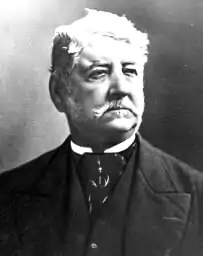 | ||||||
| 1857–1859 | George Stone (acting) | ||||||
| 1859–28 February 1862 | George Stone | ||||||
| 28 February 1862 – 31 January 1863 | John Hampton | ||||||
| 31 January 1863[3]–May 1866 | William Newland | ||||||
| May 1866–1 November 1868 | George Hampton (acting) | ||||||
| 2 November 1868[4]–30 September 1869 | John Bruce (acting) | Henry Wakeford | |||||
| 30 September 1869 – 1870 | Frederick Weld | ||||||
Unofficial nominee members, 1839–1867
In 1839 provision was made for the addition of four non-official nominee positions on the Legislative Council. The first four nominee members were sworn in on 4 March 1839. This is a list of non-official nominee members of the Legislative Council between 1839 and 1867.
| Period | Nominee members | |||
|---|---|---|---|---|
| 4 March 1839 – 1840 | William Locke Brockman |
George Leake | Thomas Peel |
William Tanner |
| 1840-May 1840 | vacant | |||
| May 1840-31 March 1841 | Edward Barrett-Lennard | |||
| 31 March[5]–April 1841 | vacant | |||
| April–July 1841 | Thomas Yule | |||
| July 1841 – 1842 | William Mackie (acting) | |||
| 1842–June 1842 | vacant | |||
| June–July 1842 | Thomas Yule | |||
| July 1842 – 1843 | William Mackie | |||
| 1843–March 1844 | vacant | |||
| March 1844 – 1846 | Francis Singleton | |||
| 1846–1847 | vacant | |||
| 1847–June 1847 | vacant | |||
| June–September 1847 | Walter Andrews | |||
| September 1847 – 1848 | vacant | |||
| 1848–October 1848 | Richard Nash | |||
| October 1848–31 May 1849 | Samuel Moore | |||
| 31 May–July 1849 | vacant | |||
| July–December 1849 | vacant | |||
| December 1849 – 1850 | Lionel Samson | |||
| 1850–December 1850 | Marshall Waller Clifton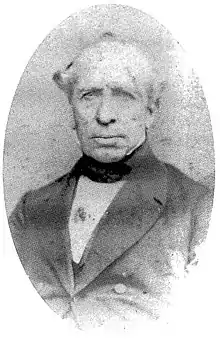 | |||
| December 1850–May 1851 | Thomas Brown (acting) | |||
| May 1851–May 1852 | Thomas Brown | |||
| May 1852–March 1855 | William Clifton | |||
| March 1855–October 1856 | John Wall Hardey | |||
| October 1856–March 1857 | vacant | |||
| March–June 1857 | Samuel Pole Phillips (acting) | Edward Hamersley | ||
| June 1857–April 1859 | Samuel Pole Phillips | |||
| April–October 1859 | vacant | |||
| October 1859 – 1867 | Lionel Samson | |||
Unofficial nominee members, 1868–1870
During the 1860s there was much public debate about the possibility of instituting representative government. This culminated in June 1865 with the submission of a petition to the Legislative Council asking for a larger and partially elected Legislative Council. As a compromise, the Legislative Council sought permission to add two more nominee members. This permission was received in September 1867, but the Governor then went further by allowing the colony to informally elect six persons whom he would then nominate to the Legislative Council. The colony was divided into six districts: Perth, Fremantle, Guildford, Eastern Districts, Murray and Champion Bay. The first five of these district elected representatives who were then nominated to the Legislative Council as promised. The Champion Bay district, which had led the push for representative government, refused to participate in what it saw as a sham election, so the Governor nominated to the final seat his ally John Wall Hardey, who had polled only four votes in the Guildford district election. This arrangement prevailed until July 1870, when the Legislative Council was reconstituted under a system of representative government.[1][2]
| Period | Unofficially elected | Nominated | ||||
|---|---|---|---|---|---|---|
| Perth | Fremantle | Guildford | Eastern Districts | Murray | ||
| July 1868–May 1870 | Julian Carr |
Walter Bateman | William Locke Brockman |
Samuel Pole Phillips | James Lee Steere |
John Wall Hardey |
| May–August 1870 | Edward Newman | |||||
References
Except where otherwise indicated, all list data was obtained from The Western Australian Parliamentary Handbook[6]
- 1 2 de Garis, Brian (1991). "The First Legislative Council, 1832–1870". In Black, David (ed.). The House on the Hill: A History of the Parliament of Western Australia. Parliament House, Perth, Western Australia: Parliament of Western Australia. ISBN 0-7309-3983-9.
- 1 2 de Garis, Brian (1981). "Political Tutelage 1829–1890". In Stannage, C. T. (ed.). A New History of Western Australia. Nedlands, Western Australia: university of Western Australia Press. ISBN 0-85564-170-3.
- ↑ Hasluck, Alexander (1959). Unwilling Emigrants. Melbourne: Oxford University Press.
- ↑ Wieck, George F. "Bruce, John (1808–1870)". Australian Dictionary of Biography. National Centre of Biography, Australian National University. ISSN 1833-7538. Retrieved 18 November 2013.
- ↑ Hasluck, Alexandra (1965). Thomas Peel of Swan River. Melbourne: Oxford University Press.
- ↑ Black, David, ed. (2005). The Western Australian Parliamentary Handbook, Twenty-first Edition. Parliament House, Perth, Western Australia: Parliament of Western Australia. ISBN 1-920830-46-4.
